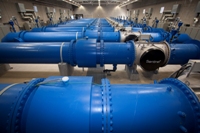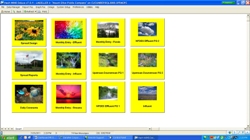
With a capacity of treating 315 million gallons of water per day, this new $114 million ultraviolet water treatment facility is now the largest-capacity facility of its kind in California and the third largest in North America.
the Smithsonian’s National Museum of the American Indian launches a new educational website, “American Indian Responses to Environmental Challenges,” that will target middle and high school teachers, students and the general public.
These findings point to climate change and variability working together equally to accelerate the observed sea ice loss during the late 20th century.
Rice University engineering researchers unveiled a new method for rapidly converting simple glucose into biofuels and petrochemical substitutes
The study, say the authors, will help to conserve some of the world’s most important coral reefs by identifying reef systems where biodiversity is high and stress is low, ecosystems where management has the best chance of success.
High concentrations of phosphorus in aquatic ecosystems are often associated with human activities in the surrounding area, such as agriculture and urban development.
The playground at Bristol Park in Turlock, Calif., is roughly 20 years old, in major need of a facelift and some TLC.
Under the terms of a settlement lodged in federal court, the City of Newport has agreed to eliminate illegal discharges of sewage into Narragansett Bay from its wastewater treatment plant and wastewater collection system.
Farmers in the Everglades Agricultural Area (EAA), south of Lake Okeechobee, achieved a record-setting 79 percent phosphorus reduction in the water leaving the farming region -- more than three times less phosphorus than the state requirement.
The cash register receipts that people place near paper money in billfolds, purses and pockets has led to a worldwide contamination of paper money with a potentially toxic substance.
There are many different types of plants in grasslands around the world. According to a new analysis of plants in grassland ecosystems around the world, it turns out that most of those plant species are important.
Algae-based fuel is one of many options among the array of possible future energy sources. New University of Virginia research shows that while algae-based transportation fuels produce high energy output with minimal land use, their production could come with significant environmental burdens.
We've all worried about the charge on our smartphone or laptop running down when we have no access to an electrical outlet. But new technology developed by researchers at the UCLA Henry Samueli School of Engineering and Applied Science could finally help solve the problem.
The Ohio State researchers argue that in this case, as forests age, they get rejuvenated with younger individuals of different species – a more-complex and -diverse community will be replacing the old guard.
While geologists and economists debate the specifics, American University School of Communication professor Matthew Nisbet believes peak petroleum and the associated risks to public health may provide an opportunity to bring conservatives and liberals together in the move toward alternative forms of energy.
The Washington Redskins announced they are working with NRG Energy, one of America’s largest energy companies, to bring renewable energy to the football franchise.
As the first bike sharing system in Texas, San Antonio’s B-Cycle addresses two top concerns in the city: providing opportunities to improve personal health and giving active transportation choices to residents and visitors.
While roofs across the world sport photovoltaic solar panels to convert sunlight into electricity, a Duke University engineer believes a novel hybrid system can wring even more useful energy out of the sun's rays.

Since Mt. Olive Pickle Company began analyzing its wastewater data electronically, it's seen a host of benefits. The solution saves time, allows better communication and even enables the company to file required reports with the state electronically.
A team of scientists just discovered a new eruption of Axial Seamount, an undersea volcano located about 250 miles off the Oregon coast – and one of the most active and intensely studied seamounts in the world.